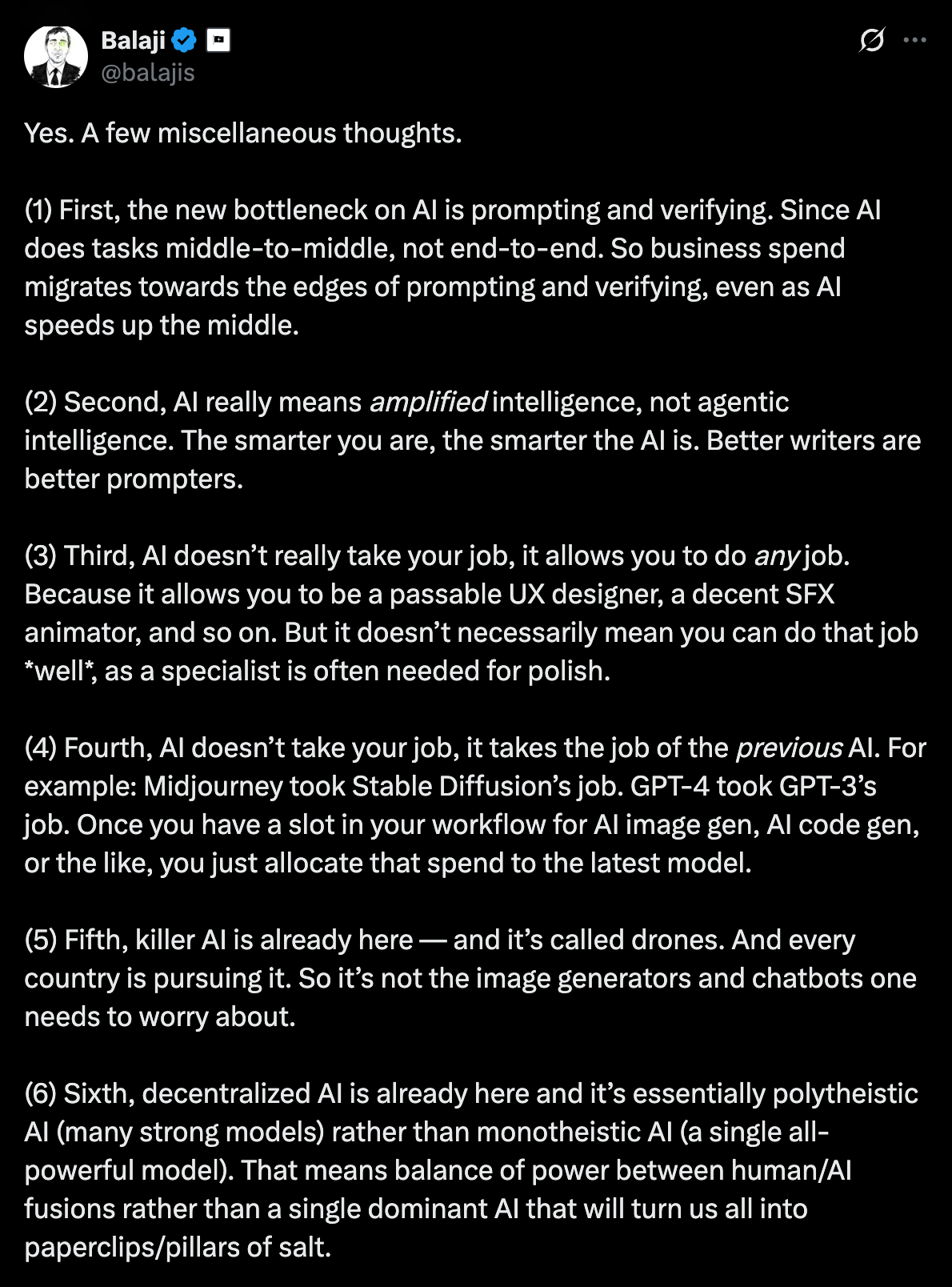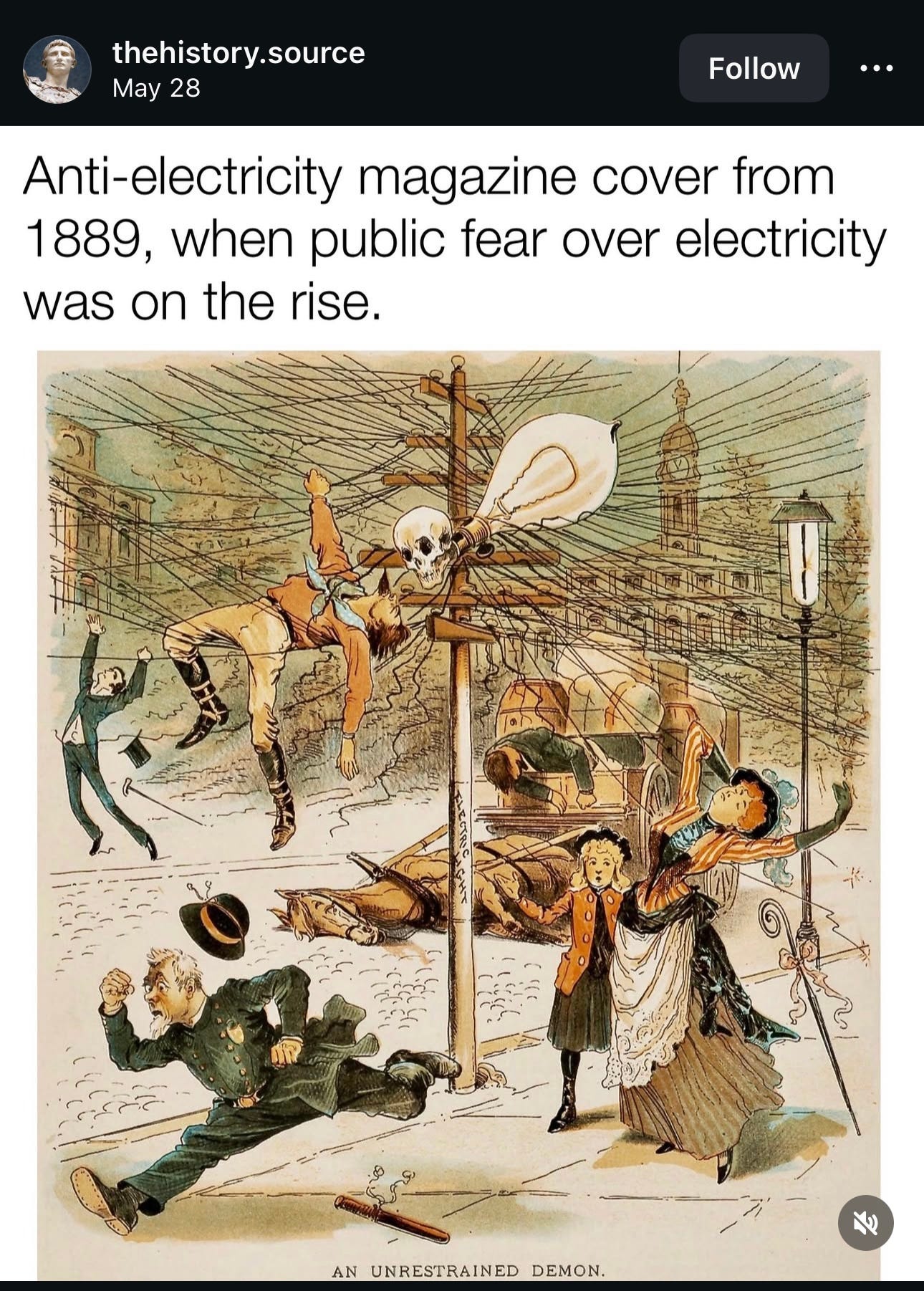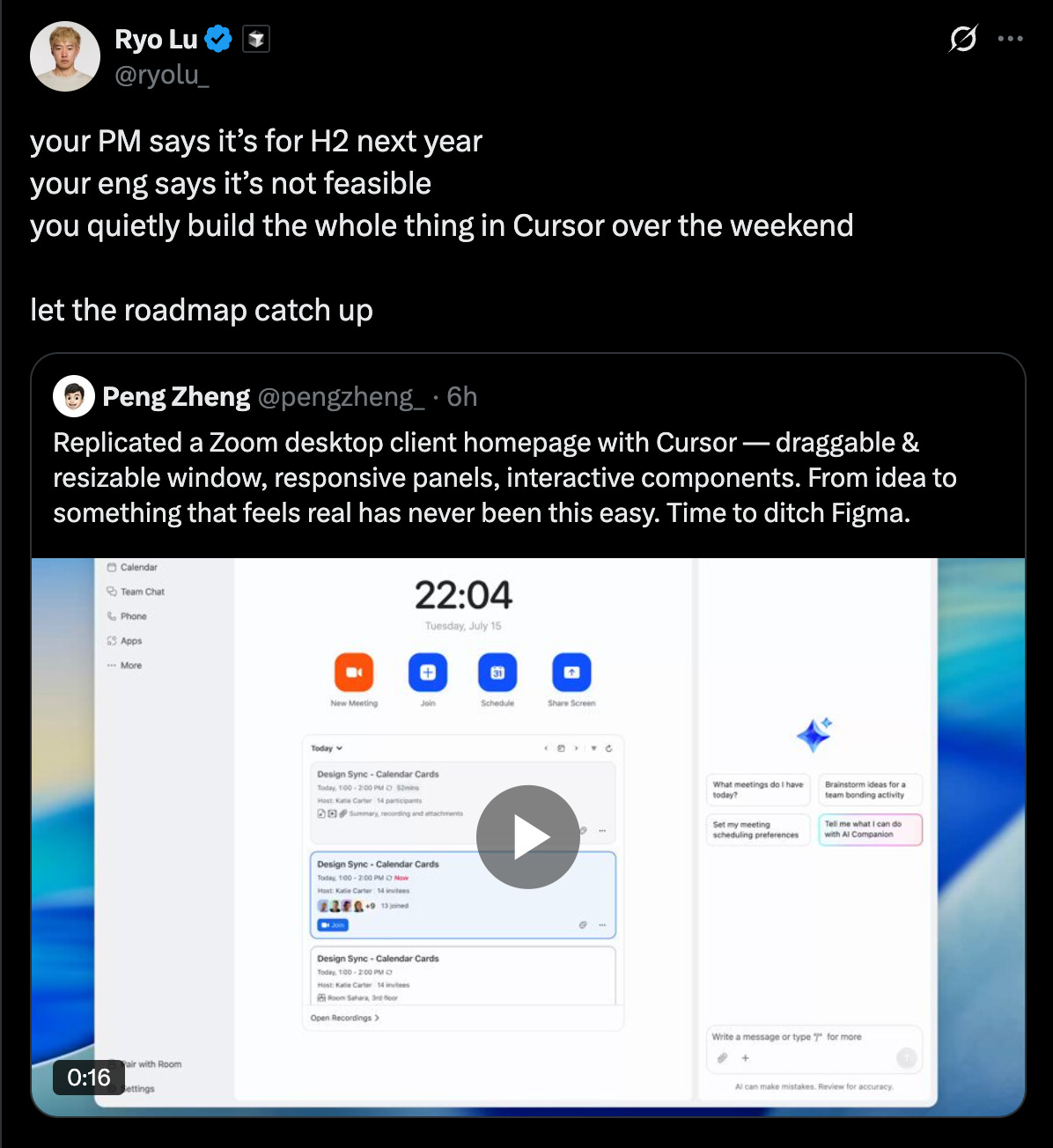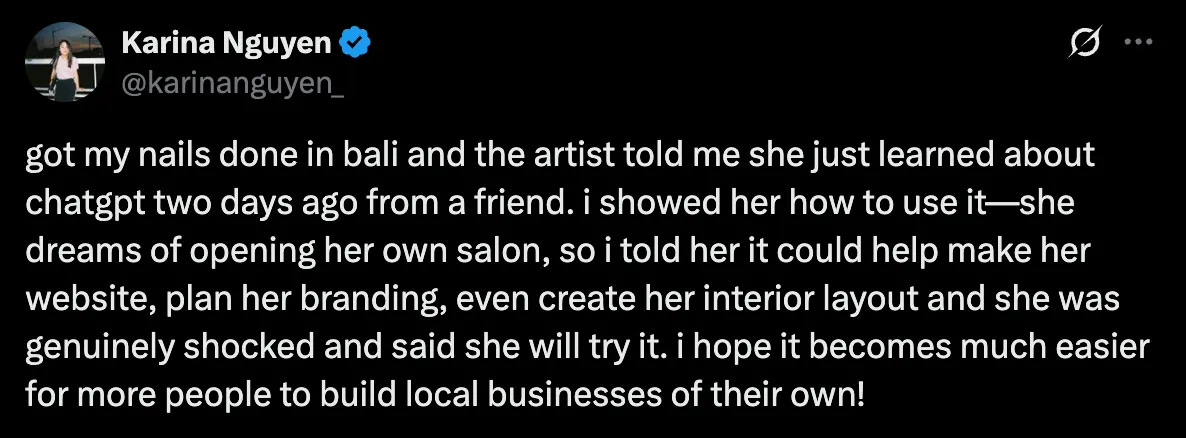Learners will inherit the earth
The Luddite's warning. Learning how to learn. On AI and adapting to change.

“In times of change, learners inherit the earth, while the learned find themselves beautifully equipped to deal with a world that no longer exists.”
— Eric Hoffer
There is a scene in the television show Peaky Blinders where Alfie Solomons, played by Tom Hardy, delivers this line during a conversation with the main character:
"Big fucks small."
Hardy uses the phrase to describe the ongoing struggle between powerful and less powerful factions—the larger, influential groups always dominating the smaller ones. It's a blunt distillation of power. It’s how the world works. This truth exists in careers, politics, negotiations, the animal kingdom, and business.
Big fucks small. Always.
The Luddite’s Warning
In 1811, English textile workers organized under a mythical figure named Ned Ludd. They weren't technophobes—they were skilled craftspeople whose livelihoods were being automated. When letters and petitions failed, they smashed the machines, not out of hatred for technology, but out of fear of being erased without voice or dignity.
The British government sent more troops to crush the Luddites than were fighting Napoleon. Seventeen were hanged. The machines kept running.
Big fucked small.
The Luddites teach us something important: resistance without adaptation is self-defeat. They fought the wrong battle. Instead of learning to work with the new machines, they tried to destroy them. Instead of becoming bigger by mastering new skills, they played the short game, not the long game.
AI is the new loom—a new tool—transforming the how of everything. People protest and plead, but the bulldozer moves on. Change has arrived. Can you overcome ego or anything blocking you from being an open vessel, absorbing the world, and learning what makes it move?
Because big fucks small.
Nearly every transformative technology has sparked the same uproar: power looms, electric lights, radio, television, the internet, and AI. Workers protested, unions resisted, and industries fought back. And yet the world moved on. Roles disappeared, new ones emerged, and culture shifted.
Now, it seems, we're living through another reset. AI is changing knowledge work and how work is done by multiple people, just as the Internet did to information and connection. The barriers are collapsing again.
The new rules are being written right now
I’m watching my industry change before my eyes every day. Every new update to an LLM model is the equivalent of a tectonic plate beneath the ground shifting suddenly.
Where designers used to take months from concept to prototype, begging for engineering resources and enduring endless presentations, I'm now watching them build working prototypes in hours using tools like Cursor. This changes the entire conversation about how ideas are made, and job expectations at companies are already changing.
This terrifies people who succeeded under the current system. It should excite everyone else.
Think about photography. Once a high-barrier industry requiring expensive gear, insider knowledge, and specialized education, Instagram and iPhones democratized it faster than it took the industry to form. Many photographers shooting major campaigns today probably didn’t attend traditional schools. They built portfolios through work, not credentials. They played new rules in a new game. The old guard complained about "Instagram photographers" ruining the profession. They're mostly irrelevant now, choosing resentment over adaptation.
The big got comfortable. The small got hungry. Small got big.
The same pattern is accelerating across every industry. Yes, white-collar jobs are getting nuked. College graduates struggle to find entry-level positions (hello, my fellow 2007 graduates). Domains built on templated knowledge and documents—law, real estate, or life insurance—face seismic disruption.
Someone with a laptop, curiosity, and ruthless determination now has more power at their fingertips. They can research any topic, learn skills, build things they couldn’t before, and play a new game that involves new experiences.
The tools are here. But do you have the discipline, the curiosity to learn?
In the last year, I’ve built things with Cursor (AI Coding for my friends who don’t know of this yet) that I genuinely would never have been able to in the past. I wouldn’t have the time to learn it all. I've built a Figma plugin based on a Japanese color theory book and an app where you can edit images using cool effects. Now, I’m building something far more complex, which is pushing me to learn the language of code.
I am challenging myself to build a full-stack product requiring complex data in the backend. I will also do the brand strategy for it, the branding, the marketing materials, and develop the website. End-to-end. I’m giving myself until the end of the year to ship version 1.
At work, we’ve enabled over 60 designers to start prototyping using AI coding. Designers are having fun every day. They can now see their ideas come to life on the screen rather than just moving around frames and rectangles in Figma. Nothing is stopping them from learning new skills and weaving those supplementary skills into their core mastery.
What stops many people, I’ve noticed, is their beliefs. The story they are telling themselves about this technology. There is so much fear, so much hesitation. I’m trying to push my friends to learn this shit versus pretending like this isn’t going to change everything.
Adaptation has always been the price of survival. Technology doesn't stop for anyone who finds it inconvenient.
“I don’t divide the world into the weak and the strong, or the successes and the failures.… I divide the world into the learners and non-learners.”
— Benjamin Barber
The Selective Outrage Problem
I know brilliant people who've already self-identified as "anti-AI" before giving it a chance. Environmental concerns, regulation fears, ethical boundaries—I get it. For what it’s worth, I do agree with these concerns.
What will it cost me if I don’t try learning these tools? Some industries might be safe in the slow adoption, but my industry is at the forefront of AI. I’m seeing and doing things that will take months or years for the general public to understand.
Let's be honest about what this selective outrage is.
The person lecturing me about AI's environmental impact also doomscrolls on TikTok for six hours, lives in one of the top 10 most expensive cities, orders GrubHub, wears Nikes, and upgrades their iPhone every year? They're not thinking about the kid in a poor country with a failing education system whose chances of becoming "big" are slim to zero.
If you pull the ethics card, especially with me, apply that scrutiny to everything in your life. Selective outrage is privilege at its worst, born from boredom and the desire to use outrage as a building block for identity or a sense of purpose. Weirdly, I am starting to see this as a unique Left-leaning identity tension.
The fact that you can even be angry about this—and that people who feel this way didn’t do research, they just read a few headlines—proves that you’ve won the genetic lottery. Congratulations: you’re among the select few million people with all the advantages in the world to become whatever you want to be and live a life that the average person will never experience.
I tell my friends with tough love: You don’t realize how lucky we are and how good we have it. Our only job is not to fuck it up. For 99.9% of the world, their focus is not to be fucked.
For what it’s worth, the early days of AI claimed to replace writers and designers. From the first DALLE-E image generation to now watching AI build entire prototypes, I will confidently say: you have nothing to be worried about, right now. It’s just a tool. It’s a black box.
Most people can spot AI writing. I don’t know of a good designer using an output from Midjourney or AI tooling straight off the press. There is editing, compositing, stitching, and much remixing going on. Even motion/animation effects cannot come close to an expert in craft and taste.
Sure, the average person will use these tools rather than hire humans. That has always happened. Website builders launched templates, and suddenly, every website was decent by default. My local bagel shop used AI images for their food, and it made me LOL.
Blaming capitalism won't save you or stop this bulldozer. Capitalism is the reason why you have the privilege of complaining, because our parents benefited from it, and because their parents suffered for it. Complaining is entitlement on display.
The worst part? It stops you from learning. It stops you from inheriting this earth. People are so online and can’t think for themselves; it’s hard to parse what you believe versus what the tribe wants you to think.
Learning is the only balm to chaos, uncertainty, fear, and change. Learning how to see, learning how the world works, learning about human nature, learning about the domain you occupy, what shaped it, and where it might go. And right now, there is a potent tool worth learning. It’s in the dial-up phase. Think about that.
I don't want to be caught off guard by this technological change because I was either too proud or too cautious to try it. Maybe in a few years, none of these tools will matter. At least I'll have given them a shot, and I will know for myself whether they were useful or not. Even if these tools are limited, I still have decades of mastery in writing, design, branding, and organizing communities to fall back on. I still know how to collaborate with others and make ideas come to life.
The Real Battle
"You never change things by fighting the existing reality. To change something, build a new model that makes the old one obsolete." — Buckminster Fuller
Look, maybe I’m far more jaded than you. Growing up as a second-generation Korean American from New Jersey with repressed anger issues separates me from you. Maybe I’m tired of being blindsided or fucked over or feeling like I missed the train. I finally feel ahead of something for the first time in my career. Maybe I see writing on the wall that puts a fire under my ass to figure out how not to be poor because I’m afraid I won’t be able to take care of my family. Maybe I realize my privilege and deeply understand how the average person lives, and I don’t want to waste it. The way I grew up colored my worldview to be Default Apocalypse. Maybe I subconsciously believe that the world is too far gone and I’ve reached the point of not giving a fuck.
I see grotesque power imbalances, incompetent leadership from government to workplaces, corruption on sale, a miasma of brain rot, civility out the window, and learned helplessness at scale. Maybe the world has always been this way, and we’re just so extremely online.
Of course, there is also tremendous beauty and progress, if you know where to look.
This is precisely why you need to get big. The world will continue to get weirder, and the pace of change will only accelerate.
I know our brains weren't designed for this pace of change. We prefer eating berries by the fire to being constantly skullfucked with a tsunami of information about the endless turmoil happening around the world.
I can easily focus on apathy and let the noise consume me. I know the world is shit, that things are just wild right now. But that madness stops you from learning new skills, seeing clearly, and finding opportunities to make a difference. The system wants you to be angry and inactive. It wants you to retweet rage bait. It wants you to have an opinion about the latest media headlines that do not matter. It keeps you small, distracted, and stupid. You are nothing more than a battery to these algorithms.

The same opportunity exists today. With more great tools and abundance. The same potential. The question isn't whether you can go from small to big—history proves you can.
No one is coming to save you. Not the President, not the government, not your manager. Not some retraining program.
Learning—self-education —will save you. What will save you are the hard things: lifting weights, writing daily, reading books, having self-discipline and rituals that fuel and bolster your humanity and curiosity, and organizing gatherings for your friends to belong and see each other.
Because here's how change works: People build new things that make old systems obsolete. They don't ask for permission. They don't wait for regulations. They don't tweet about fairness. They build. Because big fucks small.
Get big so you can help the small.
Or get big so you can fuck the other bigs.
Learn as if your life depends on it.








This is so well written, and it captures the struggle between the comforts of what we know and the fear of what we don't. It's human nature to want to retain what we know, but it's also human to learn and adapt to the world around us.
This is why I sign every issue of Timeless & Timely with the reminder "There's so much to learn."